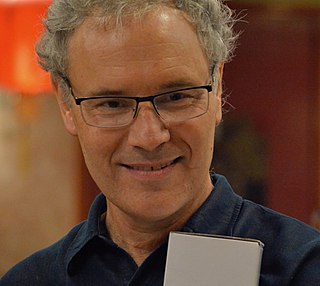
Howard Robert Horvitz ForMemRS NAS AAA&S APS NAM is an American biologist best known for his research on the nematode worm Caenorhabditis elegans, for which he was awarded the 2002 Nobel Prize in Physiology or Medicine, together with Sydney Brenner and John E. Sulston, whose "seminal discoveries concerning the genetic regulation of organ development and programmed cell death" were "important for medical research and have shed new light on the pathogenesis of many diseases".
John Graham White is an Emeritus Professor of Anatomy and Molecular Biology at the University of Wisconsin–Madison. His research interests are in the biology of the model organism Caenorhabditis elegans and laser microscopy.

Catherine Dulac is a French–American biologist. She is the Higgins Professor in Molecular and Cellular Biology at Harvard University, where she served as department chair from 2007 to 2013. She is also an investigator at the Howard Hughes Medical Institute. She was born in 1963 in France. She came to the United States for her postdoctoral study in 1991.
Barbara J. Meyer is a biologist and genetist, noted for her pioneering research on lambda phage, a virus that infects bacteria; discovery of the master control gene involved in sex determination; and studies of gene regulation, particularly dosage compensation. Meyer's work has revealed mechanisms of sex determination and dosage compensation—that balance X-chromosome gene expression between the sexes in Caenorhabditis elegans that continue to serve as the foundation of diverse areas of study on chromosome structure and function today.

Victor R. Ambros is an American developmental biologist who discovered the first known microRNA (miRNA). He is a professor at the University of Massachusetts Medical School in Worcester, Massachusetts.

Martin Lee Chalfie is an American scientist. He is University Professor at Columbia University. He shared the 2008 Nobel Prize in Chemistry along with Osamu Shimomura and Roger Y. Tsien "for the discovery and development of the green fluorescent protein, GFP". He holds a PhD in neurobiology from Harvard University.
Richard I. Morimoto is a Japanese American molecular biologist. He is the Bill and Gayle Cook Professor of Biology and Director of the Rice Institute for Biomedical Research at Northwestern University.
Simon Joseph Boulton is a British scientist who has made important contributions to the understanding of DNA repair and the treatment of cancer resulting from DNA damage. He currently occupies the position of Senior Scientist and group leader of the DSB Repair Metabolism Laboratory at the Francis Crick Institute, London. He is also an honorary Professor at University College London.

The Biozentrum of the University of Basel specializes in basic molecular and biomedical research and teaching. Research includes the areas of cell growth and development, infection biology, neurobiology, structural biology and biophysics, and computational and systems biology. With 550 employees, the Biozentrum is the largest department at the University of Basel's Faculty of Science. It is home to 32 research groups with scientists from more than 40 nations.

Anne Spang is a German Biochemist/Cell Biologist and Professor at the Biozentrum University of Basel, Switzerland.

Julie Ann Ahringer is an American/British Professor of Genetics and Genomics, Director of the Gurdon Institute and a member of the Department of Genetics at the University of Cambridge. She leads a research lab investigating the control of gene expression.

Martin Spiess is a Swiss Biochemist and former professor at the Biozentrum University of Basel, Switzerland.

Alexander F. Schier is a Professor of Cell Biology and the Director of the Biozentrum University of Basel, Switzerland.
Susan M. Gasser is a Swiss molecular biologist. From 2004 to 2019 she was the director of the Friedrich Miescher Institute for Biomedical Research in Basel, Switzerland, where she also led a research group from 2004 until 2021. She was in parallel professor of molecular biology at the University of Basel until April 2021. Since January 2021, Susan Gasser is director of the ISREC Foundation, which supports translational cancer research. She is also professor invité at the University of Lausanne in the department of fundamental microbiology. She is an expert in quantitative biology and studies epigenetic inheritance and genome stability. Recipient of multiple swiss and European awards, she was named member of the US Academy of Sciences in 2022.
Alexander Stark is a biochemist and computational biologist working on the regulation of gene expression in development. He is a senior scientist at the Research Institute of Molecular Pathology (IMP) at the Vienna Biocenter and adjunct professor of the Medical University of Vienna.

Victoria Haigh Cowling FRSE is an English biologist who received the Women in Cell Biology Early Career Medal from the British Society for Cell Biology in 2014. Cowling is Professor of Biology, Lister Institute Fellow, MRC Senior Fellow and Deputy Head of The Centre for Gene Regulation and Expression at the University of Dundee.
Alice Barkan is an American molecular biologist and a professor of biology at the University of Oregon. She is known for her work on chloroplast gene regulation and protein synthesis.

Joseph Heitman is an American physician-scientist focused on research in genetics, microbiology, and infectious diseases. He is the James B. Duke Professor and Chair of the Department of Molecular Genetics and Microbiology at Duke University School of Medicine.

Pierre Gönczy is a Swiss and Italian cell and developmental biologist. His research focuses on centriole biology and asymmetric cell division. He is currently professor at École Polytechnique Fédérale de Lausanne (EPFL), where he directs the Laboratory of Cell and Developmental Biology.
Iva Susan Greenwald is an American biologist who is Professor of Cell and Molecular Biology at Columbia University. She studies cell-cell interactions and cell fate specification in C. elegans. She is particularly interested in LIN-12/Notch proteins, which is the receptor of one of the major signalling systems that determines the fate of cells.












